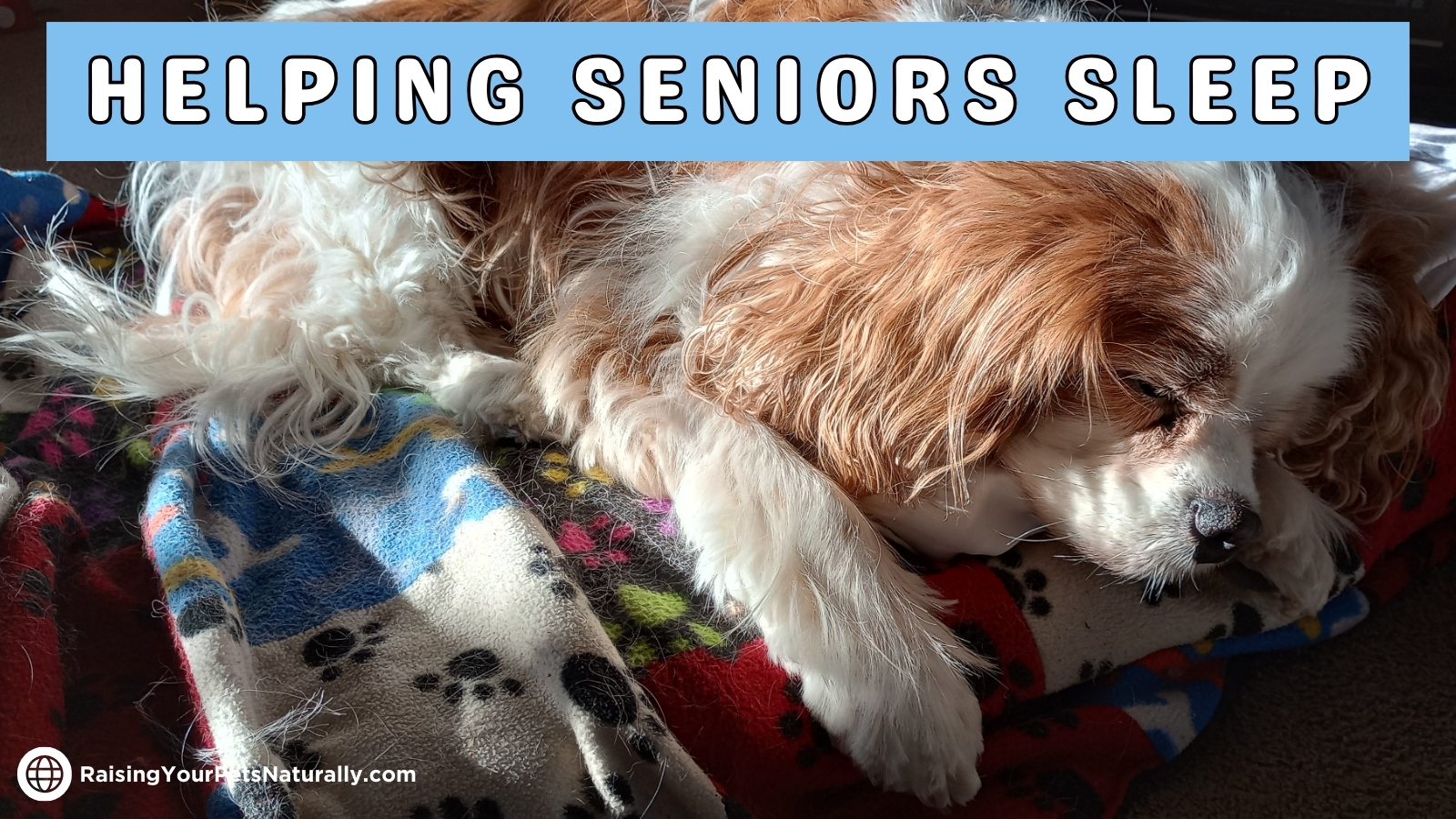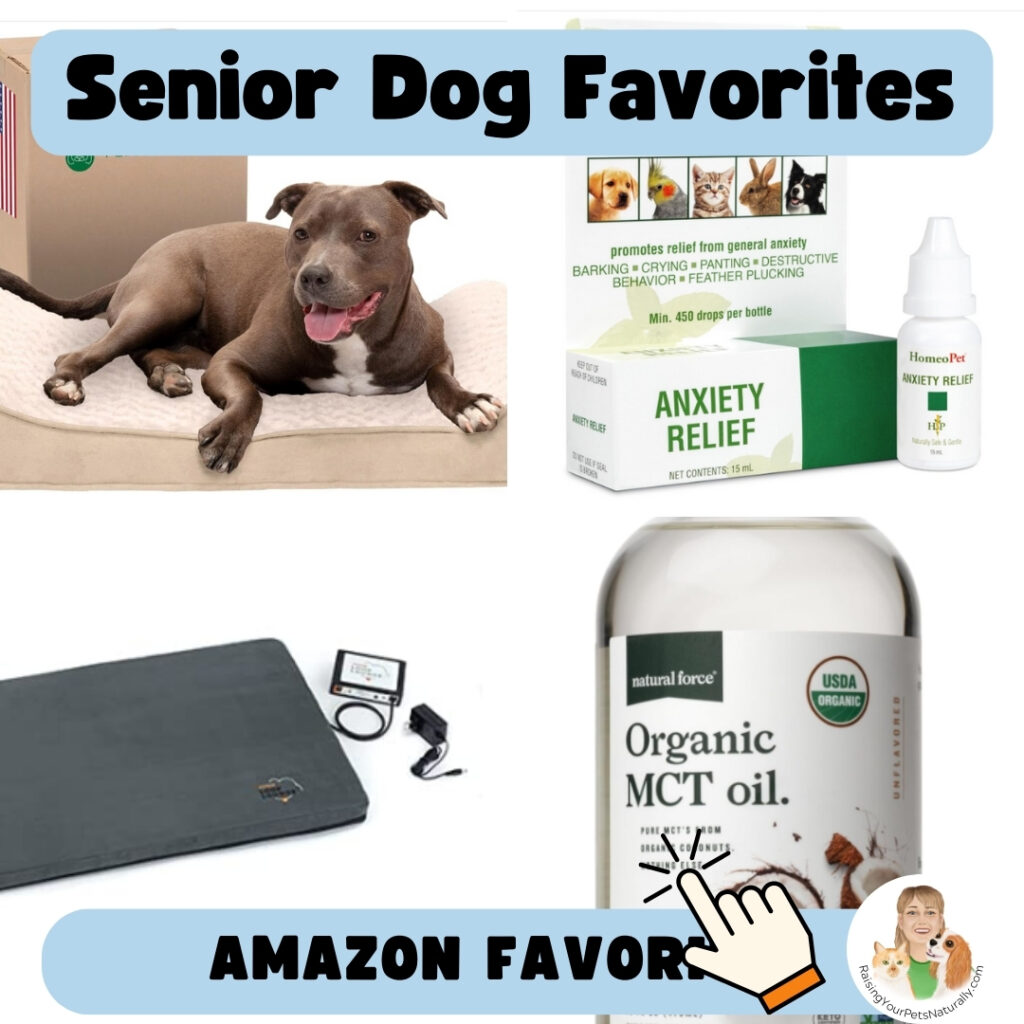Google Adsense—>

Understanding and Soothing Nighttime Anxiety in Senior Dogs

Oh, Dexter. My fourteen-year-old Cavalier King Charles Spaniel has always been a happy, well-adjusted, easygoing, confident dog. When I started to see him struggle with restless nights, my heart broke. He was pacing, panting, and just plain restless. Since he has mitral valve disease, I wanted to make sure it wasn’t heart related, so I took him to his vet. His regular cardiologist visit was around the corner, but I wanted a quick answer to ensure his MVD didn’t progress drastically. Thankfully, the vet ruled out heart issues, leading us to the onset of senior dog nighttime anxiety. I was relieved, yet saddened; my confidant boy was having some stress in his life.
If you’re facing similar issues with your senior dog, you’re not alone. Today, I’m going to dive into senior dogs who are restless at night, the causes, possible solutions, and what I’ve done to help Dexter…and me get our sleep back.
Why Do Senior Dogs Get Restless at Night?
I spoke with Bethany Hsia, DVM and co-founder of CodaPeta, and she offered these insights. “Anxiety in senior dogs at night can be caused by a variety of factors, including doggy dementia and sundowning. Cognitive Dysfunction Syndrome (CCD), commonly referred to as doggy dementia, is a condition similar to Alzheimer’s disease in humans and is characterized by a decline in cognitive function as dogs age. Symptoms of CCD can include disorientation, changes in sleep patterns, increased anxiety or agitation, and decreased interaction with family members. These symptoms can often be more pronounced at night, leading to anxiety and restlessness in senior dogs.”
She went on to say, “Sundowner’s syndrome, also known as sundowning, is a phenomenon observed in some senior dogs where they experience increased anxiety and restlessness during the evening or at night. This condition can lead to pacing, vocalization, and other signs of distress as the sun sets or when the environment becomes darker.” Read more about dog dementia in this article.
Solutions to Canine Restlessness at Night
- A Vet Visit is Your First Step
Before trying home remedies for your dog’s restless nights, consult your dog’s holistic veterinarian to rule out underlying medical conditions like pain, urinary tract infections, heart disease, or even CDS. Your vet should always be your first go-to as far as your dog’s health is concerned. Remember, dog blog posts, such as mine, are stepping stones, not medical advice.
- Recognizing the Signs of Anxiety
The first step in helping your dog at night is to look for changes in your dog’s behavior. Some of the common signs of senior dog anxiety include:
- Pacing, panting, whining, or barking
- Disorientation or confusion (wandering, staring blankly)
- Difficulty settling down
- Increased urination (often due to anxiety, not a UTI)
- Excessive licking or chewing
- Changes in sleep patterns (waking up frequently, restlessness)
Remember, these signs can also indicate other concerns. Remember the all-important vet visit!
- Proactive Measures to Calm Your Senior Dog
We all want our senior dogs to enjoy life and get a good night’s sleep. Feeding them fresh food, keeping their minds active, and sticking to a routine are great ways to support their health. But sometimes, as our dogs age, brain changes can lead to nighttime restlessness and anxiety. I know it can be stressful for them and you, but don’t give up! There are a lot of things we can do to help our senior dogs. And it’s not just about one solution, but rather a variety of things that can improve their nights, like nutrition, mental enrichment, exercise, and routine. They all work together. Think. Synergy!! I talk about it all the time. Each element contributes in its own way, complementing and enhancing the effectiveness of the others. We are treating the whole dog.
- Daily Exercise and Mental Stimulation: Keep your senior dog’s mind and body active with gentle walks, interactive toys, and short positive training sessions. Exercise releases endorphins, which can really lift your dog’s mood and make them feel better. Keeping your dog’s mind busy fights both boredom and cognitive decline.
- Comfortable Sleeping Environment: Provide a supportive bed, ideally in your bedroom. If your dog can’t sleep with a family member, look for a room that is quiet and draft-free with consistent lighting. Familiarity and comfort reduce nighttime anxieties. Also, consider adding blankets or bedding with your scent for increased reassurance.
- Maintain a Consistent Routine: Set predictable mealtimes, walks, and bedtime rituals to create a sense of security and predictability. I’ve noticed this is becoming more important to Dexter. He starts squeaking and demanding his nighttime snack! Try to keep these routines as close to their usual schedule as possible, as it helps signal to your dog it’s time to wind down and relax.
- Social Interaction: Ensure your senior gets quality time with loved ones, even if it’s just gentle cuddles. Social interaction reduces stress and provides comfort. Spending quality time with your dog strengthens your bond and helps them feel safe and loved.
- Calming Supplements: There are a variety of natural calming supplements, herbals, and flower essences can promote relaxation and improve sleep. L-theanine and melatonin are often used to improve sleep quality. As always, please work with your dog’s veterinarian to find the right one for your dog. Even natural remedies can interact with medical issues or medications. For Dexter, his vet and I went over all of his current supplements and medications. We decided to start with L-theanine. She also provided me with his dosing range, allowing me to monitor his sleeping habits, and I can increase or decrease in his range.
- Calming Pheromones: Diffusers or sprays mimic natural calming pheromones, creating a sense of safety and relaxation. I’ve used them for years in my dog training classes and with private students. When Dex was a puppy, I had one to help him transition to his new home. I now have one in our bedroom, and I plug it in about thirty minutes before bed. I’ve also added in the spray, so I can use it in other parts of the home to help him with his senior dog separation anxiety. More on that in the future. If you choose the spray, I recommend spraying a blanket.
- Massage Therapy: Gentle massage reduces muscle tension, promotes relaxation, and eases anxiety. Spend a few minutes each evening gently massaging your senior dog’s muscles, focusing on areas where they hold tension. A loving massage can do wonders for your senior dog’s mind and sleep quality.
- Canine Enrichment: Food puzzles, scent work, and other mentally engaging activities fight off boredom, cognitive decline, anxieties, and promote a Zen feeling. Consider introducing new toys or rotating existing ones to keep your senior dog mentally engaged and content. These activities not only keep their minds sharp but also give them a boost of self-confidence, something I think is important as their bodies start to not cooperate as before.
- Mobility and Fitness: Gentle exercises like short, leisurely walks or incorporating gentle stretching exercises into your senior dog’s daily routine will help keep their joints flexible and their muscles strong. Getting regular exercise can make a big difference in your dog’s life, helping them feel better and sleep more soundly at night. If you work with a canine rehab professional, they can tailor exercises like underwater treadmill sessions to your dog’s needs, which can really improve their mobility and health. Dexter has been in rehab for years for his Chiari malformation and syringomyelia. Just over a year ago, we bumped up his sessions to every other week. And boy, what an improvement! He is so much more mobile and spunky than he was prior.
- PEMF Therapy: PEMF (Pulsed Electromagnetic Field Therapy) uses electromagnetic fields to help the body heal. This treatment is gentle and painless, and the electromagnetic pulses penetrate deep into the body to ease inflammation and pain. It helps decrease discomfort, encourages relaxation, and enhances sleep quality. Dexter has been benefiting from this therapy for years. I try to make it a point to have him relax on his PEM bed in the evening. Read more about PEMF therapy here.
- Cold Laser Therapy: Cold laser therapy is another natural treatment to reduce both pain and inflammation. And, you guessed it, something Dexter has been using for ages. Cold laser therapy, also known as low-level laser therapy (LLLT), utilizes specific wavelengths of light to target areas of pain or inflammation. Read more about cold laser therapy for pets here.
- Calming Music: Calming music and natural sounds have a soothing effect, helping to lower stress levels and encourage relaxation. I first used a dog calming CD with my extremely phobic dog Theo. This was back in 2006. And it worked! It by no means cured his anxieties, but it aided him being able to relax in less stressful times. When Dexter came into my life in 2009, I played a calming CD when we went to bed and every time he was crated. He was soon conditioned when the CD played; it was sleepy time. Now, I have a music box I play at night and when he’s left alone. It has a lovely flute sound. As a bonus, it has a blue light; more on that next. By incorporating these comforting sounds into your senior dog’s bedtime routine, you can create an environment encouraging restful sleep.
- Blue Light Therapy: Blue light therapy utilizes specific wavelengths of light, typically in the blue spectrum, to promote relaxation and reduce stress. Blue light therapy creates a soothing atmosphere, helping to promote deep relaxation. Now, this is not to be confused with the blue light emitted from devices such as our cell phones. Blue light bulbs mix blue with other colors and are on a different spectrum than cell phones. Cell phones emit blue light with a shorter wavelength range, which is considered most disruptive to sleep and potentially harmful to eye health.
- I learned about blue light therapy for senior dogs through a senior dog group. Blue light doesn’t suit every dog. In Dexter’s nighttime routine, it’s been a success. To gauge the senior dog’s community’s experience, I conducted a poll within the group. Surprisingly, 64% (25) reported no change, 24% (9) found it helpful, and 12% (5) observed increased restlessness. However, different colors work better for different dogs. Some members found an improvement with colors like red, green, or amber. I tried these colors with Dexter, and they each made Dexter more restless. What’s great about Dexter’s music and light box is its flexibility; you can enjoy music with or without lights, and change the color and music to cater to individual preferences. I would say to see if it helps your dog.
- Acupuncture: Works with your senior dog’s energy flow to target and relieve imbalances that might cause anxiety and restlessness. Acupuncture targets specific points on your dog’s body to help restore balance and encourage deep sleep. And, guess what? Dexter also receives acupuncture. Now, I haven’t actually talked to his veterinarian about targeting anything specific to sleep, but he’s been receiving treatment for his CM/SM and his old man body. Read more about canine acupuncture here.
- Fresh Food Diet or Toppers: Nutrition plays a crucial role in supporting both their physical and mental health. Dexter was a raw-fed puppy, a home-cooked teenager, and is now a raw-fed senior. Let’s take a look at some fresh foods and their possible benefits for your senior dog.
-
- Fatty fish: Loaded with Omega-3s, which are essential for brain health and reducing inflammation. Consider adding mackerel, herring, salmon, or sardines. If you are feeding raw, freeze the fish for 3 weeks prior to serving to kill any parasites.
- Coconut oil: Packed with medium-chain triglycerides (MCTs), which are readily absorbed by the brain to provide a quick source of energy and support cognitive function. Adding a spoonful of coconut oil to your senior dog’s meals is a healthy way to improve their cognition. If you have a Cavalier King Charles Spaniel, please read this article prior to feeding coconut oil.
- Berries: I love adding fresh berries to Dexter’s diet. Dexter also enjoys them dehydrated as a treat. Berries are packed with antioxidants like flavonoids and vitamin C, which defend brain cells from harm. Adding a handful to your senior dog’s meals is an easy way to support their mental sharpness!
- Eggs: Eggs are loaded with protein, amino acids, vitamins like A, B, and D3, and essential minerals like magnesium and iron. These nutrients help keep senior dogs healthy by providing the key nutrients their bodies need to function, protecting cells from damage, promoting good bone health and joint mobility, and, of course, nourishing their minds. Eggs contain fatty acids, which support brain health and can reduce inflammation, making them a great addition to your senior dog’s diet. Dexter loves his eggies! You can feed raw, boiled, or scrambled. Learn more about eggs in this article.
- Leafy greens: Broccoli, kale, and spinach are packed with vitamins and minerals essential for brain health. They’re full of antioxidants and nutrients like vitamin K, lutein, and folate, which keep your senior dog’s brain sharp and protect against cognitive decline. You can chop, blitz, or steam your dog’s greens and mix them into your senior dog’s meals. I do have to sneak them into Dexter’s meals. He’s not in love with his greens.
Adjusting to senior dog anxiety may feel overwhelming. I get it. And honestly, I’m just so thrilled Dexter is in his senior years. It makes me incredibly happy he’s fourteen and still going strong. Understanding your dog’s body and mind are going through changes can help with our own interpretations and hopefully help us stay calm and compassionate. Following some of these ideas and having a good relationship with your dog’s vet can create a more Zen-like sleeping routine for both your dog and you. Take a breath, cherish the wins, and know they love you, and your love is everything to them. To the moon and back.
- https://www.vet.cornell.edu/departments/riney-canine-health-center/canine-health-information/senior-dog-dementia
- https://www.nature.com/articles/s41598-022-15837-9
Your questions or comments are welcome below.
Are you looking for even more ways to stay up to date with Raising Your Pets Naturally? Sign up for the newsletter for more tips and promotions. Don’t forget to be social and Like, Follow and Subscribe.
Facebook Twitter Pinterest Instagram YouTube
 |

Google Adsense—>






